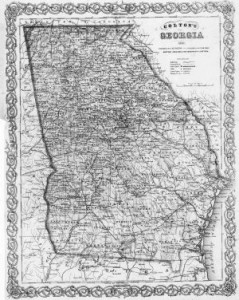 Death visits soldiers with increasing regularity. Georgia Methodist minister Rev. William M.Crumley, chaplain of the Georgia Confederate hospital in Richmond, Virginia, in today’s Augusta Daily Constitutionalist offers assessments of the Georgia hospital and the the Confederate cemetery in Richmond, as well as a glowing, if perhaps biased, description of Confederate soldiers.
Death visits soldiers with increasing regularity. Georgia Methodist minister Rev. William M.Crumley, chaplain of the Georgia Confederate hospital in Richmond, Virginia, in today’s Augusta Daily Constitutionalist offers assessments of the Georgia hospital and the the Confederate cemetery in Richmond, as well as a glowing, if perhaps biased, description of Confederate soldiers.
His words, penned in late December, include a poignant description of the last days of a hospitalized Baptist soldier from Georgia.
Dear Sir:
I snatch a brief moment from my hours of sleep to give you some of the items which I have jotted down by the way, hoping they may prove of interest, and cheer you in your work of humanity.
Oak Wood is a new cemetery, East of Richmond, and about two miles distant from it. The Western side has been set apart as a burial place for the soldiers of the Confederate Army. It was opened on the 15th of September, and there are in it now nearly four hundred new made soldiers’ graves. The soldiers lie in long parallel lines, between a row of beautiful cedar trees on the one side, and of silver maples on the other. A few days since, these new made graves were covered with a lovely mantle of untrodden snow.
The graves are dug four feet deep, and the dead are laid away in raised lid coffins, enclosed in a good pine box. The Georgia soldiers are accompanied with a carriage, containing the Chaplain and any friend who may wish to see the corpse deposited in its place of rest.
This is an arrangement peculiar to our Georgia soldiers. There are several neat stones marking the spot of loved ones. The dead are so arranged that any friend, at any time, can find where their relatives are sleeping. A beautiful shaft, with the lone star upon it, marks the spot where a group of Texans are laid. The Georgians who are not sent home are mostly buried in this cemetery. There are other burial places that may be noticed in some future letter.
How sad one feels in walking through this regiment of the dead! Noble, patriot sons of Georgia! They now rest on their arms unmoved by the muffled drum, or the musket’s sharp salute, that marks the coming of others to swell their fast growing ranks. Brave souls that would have poured out their best blood like water, on the field of battle, in defence of their country’s rights, have here fallen victims of the insidious hands of disease. In the cay of victory, and on the return of peace, they shall be remembered. Their names woven into songs dear as liberty to Southern hearts, shall never die. I purpose in these sketches to rescue some of them from oblivion, that ocean in which so many precious jewels have been swallowed up.
In presenting these sketches, for prudential reasons I shall sometimes omit names and group the characters so as to form a striking contrast. There is no want of incidents. The only trouble is, out of so many to make suitable selections.
Our soldiers are not such men as generally fill up the ranks of an army. They are gentlemen, men of wealth, education, and of high social position at home. Such are the men found here in the Georgia Hospitals.
There, on that couch of pain, is a Lieutenant, once a noble, manly form, but now pale and helpless as an infant. On the next bunk, is his father, a plain rough old man, and a wealthy farmer. While watching tenderly, and with a father’s anxious care, by the bedside of his suffering son, he is himself seized and prostrated by disease, and expires in an agony of despair, being destitute of the Christian’s hope. Not far off lies a weak and gentle youth, over whose head but nineteen summers’ suns have passed. A member of the Baptist Church , full of faith and hope, he speaks confidently and cheerfully of home and Heaven, and breathes his last, soft as an angel’s slumbers. That young man was J. D. Keown, son of N. L. Keown of Walker county. His father, who was here today, watered with his manly tears the sod that covered his brave soldier boy.
The hour is late. I must bid you good night.
Yours, as ever,
W. M. Crumley.
Sources: “Letters from Rev. Mr. Crumley, Augusta Daily Constitutionalist, January 5, 1862 (link); “Bibb County Georgia Biographies,” Crumley, William Macon (link)


